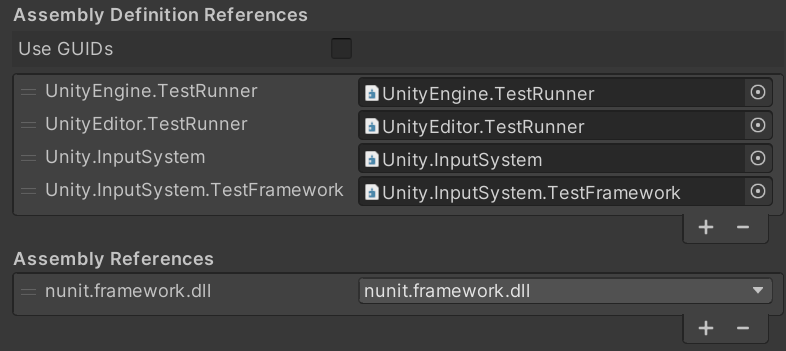【Unity学习笔记】Unity TestRunner使用
发布时间:2024年01月21日
转载请注明出处:🔗https://blog.csdn.net/weixin_44013533/article/details/135733479
作者:CSDN@|Ringleader|
参考:
- Input testing
- Getting started with Unity Test Framework
- HowToRunUnityUnitTest
- 如果对Unity的newInputSystem感兴趣可以参看我这篇文章:【Unity学习笔记】第十二 · New Input System 及其系统结构 和 源码浅析
使用步骤
-
打开Unity Test Runner(菜单栏中的 Windows?General?Test Runner)
-
添加测试文件夹,在此文件夹下添加assembly definition (菜单栏中: Create > Assembly Definition)

-
点击Assembly文件的Inspector窗口,添加 nunit.framework.dll、UnityEngine.TestRunner、 UnityEditor.TestRunner, 测试Input System时额外添加 Unity.InputSystem 和Unity.InputSystem.TestFramework。

-
文件夹下添加代码,或使用NewInputSystem官方提供的测试用例 Unity-Technologies/InputSystem

-
运行测试

使用案例
放一个NewInputSystem的使用案例:
using System.Diagnostics.CodeAnalysis;
using NUnit.Framework;
using UnityEngine.InputSystem;
#pragma warning disable CS0649
// As should be obvious from the number of tests in here, the action system rivals the entire combined rest of the system
// in terms of complexity.
namespace Scenes.TestAction
{
[SuppressMessage("ReSharper", "AccessToStaticMemberViaDerivedType")]
public class TestAction : InputTestFixture
{
[Test]
[Category("Actions")]
public void Actions_WhenShortcutsDisabled_AllConflictingActionsTrigger()
{
var keyboard = InputSystem.AddDevice<Keyboard>();
var map1 = new InputActionMap("map1");
var action1 = map1.AddAction(name: "action1");
action1.AddCompositeBinding("2DVector")
.With("Up", "<Keyboard>/w")
.With("Down", "<Keyboard>/s")
.With("Left", "<Keyboard>/a")
.With("Right", "<Keyboard>/d");
var map2 = new InputActionMap("map2");
var action2 = map2.AddAction(name: "action2");
action2.AddCompositeBinding("2DVector")
.With("Up", "<Keyboard>/w")
.With("Down", "<Keyboard>/s")
.With("Left", "<Keyboard>/a")
.With("Right", "<Keyboard>/d");
var action3 = map2.AddAction(name: "action3", binding: "<Keyboard>/w");
map1.Enable();
map2.Enable();
Press(keyboard.wKey);
// All Actions were triggered
Assert.That(action1.WasPerformedThisFrame());
Assert.That(action2.WasPerformedThisFrame());
Assert.That(action3.WasPerformedThisFrame());
}
}
}
文章来源:https://blog.csdn.net/weixin_44013533/article/details/135733479
本文来自互联网用户投稿,该文观点仅代表作者本人,不代表本站立场。本站仅提供信息存储空间服务,不拥有所有权,不承担相关法律责任。 如若内容造成侵权/违法违规/事实不符,请联系我的编程经验分享网邮箱:chenni525@qq.com进行投诉反馈,一经查实,立即删除!
本文来自互联网用户投稿,该文观点仅代表作者本人,不代表本站立场。本站仅提供信息存储空间服务,不拥有所有权,不承担相关法律责任。 如若内容造成侵权/违法违规/事实不符,请联系我的编程经验分享网邮箱:chenni525@qq.com进行投诉反馈,一经查实,立即删除!
最新文章
- Python教程
- 深入理解 MySQL 中的 HAVING 关键字和聚合函数
- Qt之QChar编码(1)
- MyBatis入门基础篇
- 用Python脚本实现FFmpeg批量转换
- 【LearnOpenGL基础入门——6】纹理
- 【JavaScript】浮点数精度问题
- MR实战:实现数据去重
- 多module项目的springboot配置swagger
- Cmake(1)——Cmake的基本介绍和原理、Cmake的安装、如何使用Cmake构建项目
- 解读 | Mint Blockchain 为何选择 OP Stack 作为 L2 技术方案?
- 【注解和反射】--05 反射的性能对比、反射操作泛型和注解
- oracle 安装时报[INS-13001]环境不满足最低要求
- python-time模块使用
- 【PTA】L1-050 倒数第N个字符串——MZH